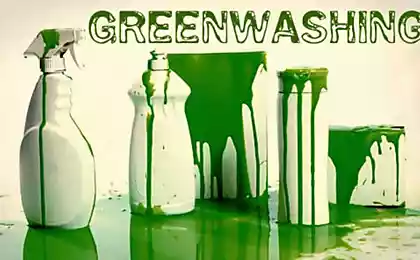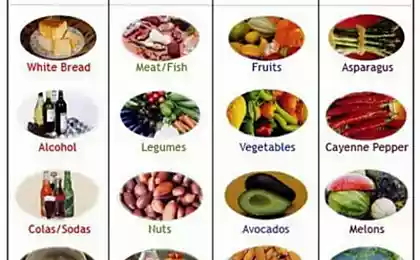437
7 Sins of greenwashing and 5 ways to avoid it
How to make sure that all of your "natural" products are really genuine.
Green products ranging from electric cars and finishing reusable shopping bags, are gaining momentum and becoming more popular every day. This is good news for eco-friendly consumer, as companies are doing everything possible to offer greener versions of their products to meet demand.
Unfortunately, many companies have also noticed that it is much cheaper to claim that they comply with the standards of environment, health and safety, than to live by them actually. When a company misleads its customers about the safety or environmental impact of their products, this is called greenwashing (greenwashing).
In 2010, the canadian eco-marketers TerraChoice investigated 4744 green products and identified 7 sins of greenwashing (which anyway was in 95% of these products)
The Hidden Compromise
Labeling a product as environmentally friendly, is based on too narrow a set of criteria. While many other criteria the product is not environmentally friendly. For example, (made from recycled content) when other attributes not addressed (i.e. energy use for production, gas emissions, etc.) could make a greater impact on the environmental friendliness of the product as a whole.
The lack of evidence
Environmental friendliness of the product cannot be supported by available information from reliable independent source. (that is, the light bulb is touted as energy efficient with no supporting data).
Uncertainty
Use terms that are too broad or poorly defined to be properly understood (i.e. "all natural" purity may also contain harmful ingredients that have nature).
Worshiping false labels
Product packaging is non-existent badges of certifications, similar to the real thing. These symbols mean nothing, but give the impression that the product is approved by some third party.
The futility
A statement about environmental sustainability may be true, but completely useless for the buyer.
The lesser of two evils
The claim that the product is greener than other products in its category when the category as a whole may be environmentally unfriendly (i.e. vodka Organic may be greener but you know it's still vodka).
Cheating
Advertising that simply is not true (i.e., the manufacturer claims that its product is Energy Star Certified, but no).
Because the TerraChoice study emphasizes that everywhere rampant green camouflage, making subtle those who can be trusted. To be safe, make sure you source of information when buying explore the criteria for each product that they sell in their stores.
It requires a lot of work, but fortunately there are a growing number of allies in the fight for honesty and transparency in marketing.
Every day a growing number of environmental labels and certificates that provide specialized organizations for products that meet their quality, ingredients and environmental standards. They often are more credible than labels, which provide the producers themselves, as they provided an impartial third party and often take into account the completeness of the production process of the product.
In that time, both organizations can help to put pressure on the practice of greenwashing, ultimately, everything is in the hands of the consumer, whose responsibility it was to tell about the businesses that allow violations.
Here are 5 simple ways to avoid greenwashing your products and Your home:
1. Tell a friend. The more people know about the problem, the easier it is to fight.
2. Examine the reliability of the logos on your labels. There is an interesting game study right green logo, play it and put it in your list of domestic logos as they appear.
3. Review existing eco-labels. They are in the book eco-labeling. A guide for business and thoughtful buyers
4. Make yourself a cheat sheet with the basic ecologocial and wear their wallet.
5. Visit shops in which sellers share your desire to obtain an honest product.
Here's an interesting infographic about greenwashing, which may be useful for you:
Source: rodovid.me
Green products ranging from electric cars and finishing reusable shopping bags, are gaining momentum and becoming more popular every day. This is good news for eco-friendly consumer, as companies are doing everything possible to offer greener versions of their products to meet demand.
Unfortunately, many companies have also noticed that it is much cheaper to claim that they comply with the standards of environment, health and safety, than to live by them actually. When a company misleads its customers about the safety or environmental impact of their products, this is called greenwashing (greenwashing).
In 2010, the canadian eco-marketers TerraChoice investigated 4744 green products and identified 7 sins of greenwashing (which anyway was in 95% of these products)
The Hidden Compromise
Labeling a product as environmentally friendly, is based on too narrow a set of criteria. While many other criteria the product is not environmentally friendly. For example, (made from recycled content) when other attributes not addressed (i.e. energy use for production, gas emissions, etc.) could make a greater impact on the environmental friendliness of the product as a whole.
The lack of evidence
Environmental friendliness of the product cannot be supported by available information from reliable independent source. (that is, the light bulb is touted as energy efficient with no supporting data).
Uncertainty
Use terms that are too broad or poorly defined to be properly understood (i.e. "all natural" purity may also contain harmful ingredients that have nature).
Worshiping false labels
Product packaging is non-existent badges of certifications, similar to the real thing. These symbols mean nothing, but give the impression that the product is approved by some third party.
The futility
A statement about environmental sustainability may be true, but completely useless for the buyer.
The lesser of two evils
The claim that the product is greener than other products in its category when the category as a whole may be environmentally unfriendly (i.e. vodka Organic may be greener but you know it's still vodka).
Cheating
Advertising that simply is not true (i.e., the manufacturer claims that its product is Energy Star Certified, but no).
Because the TerraChoice study emphasizes that everywhere rampant green camouflage, making subtle those who can be trusted. To be safe, make sure you source of information when buying explore the criteria for each product that they sell in their stores.
It requires a lot of work, but fortunately there are a growing number of allies in the fight for honesty and transparency in marketing.
Every day a growing number of environmental labels and certificates that provide specialized organizations for products that meet their quality, ingredients and environmental standards. They often are more credible than labels, which provide the producers themselves, as they provided an impartial third party and often take into account the completeness of the production process of the product.
In that time, both organizations can help to put pressure on the practice of greenwashing, ultimately, everything is in the hands of the consumer, whose responsibility it was to tell about the businesses that allow violations.
Here are 5 simple ways to avoid greenwashing your products and Your home:
1. Tell a friend. The more people know about the problem, the easier it is to fight.
2. Examine the reliability of the logos on your labels. There is an interesting game study right green logo, play it and put it in your list of domestic logos as they appear.
3. Review existing eco-labels. They are in the book eco-labeling. A guide for business and thoughtful buyers
4. Make yourself a cheat sheet with the basic ecologocial and wear their wallet.
5. Visit shops in which sellers share your desire to obtain an honest product.
Here's an interesting infographic about greenwashing, which may be useful for you:
Source: rodovid.me























